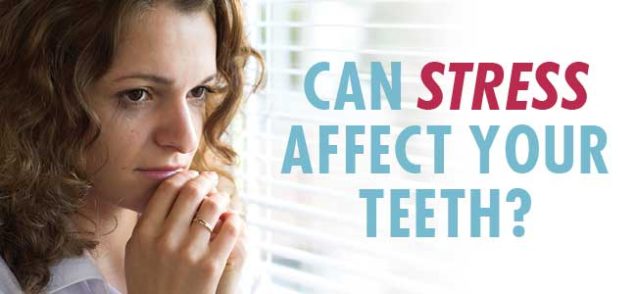Stressed Out: Can Stress Affect Your Teeth?
Stressed Out: Can Stress Affect Your Teeth?
You have too much to do at work. You have to juggle a million tasks between your children, your spouse, and errands — not to mention your mother-in-law is in town for the weekend. We all have those days, and those days can add immense stress to your life. That stress affects more than just your emotional health; it physically alters you as well.
Physical Symptoms of Stress on Your Mouth
Your mouth already experiences daily wear and tear that you need to prevent as much as possible. If you are too stressed, this adds another layer of factors fighting against the health of your mouth. It starts before you even realize — you are stressed out thinking about everything you need to do, and then you notice you’ve been clenching your teeth for the past few minutes. Depending on how you handle stress, you may be doing this multiple times per day, which takes a toll on your mouth.
Stress-related clenching and teeth grinding (also called bruxism) can carry into the night while you sleep. If left untreated, bruxism can also destroy dental restorations (fillings, crowns, bridges, etc.) that you’ve had done, creating more pain and costing more money. Additionally, this can lead to temporomandibular joint disorders (TMJ/TMD). Symptoms can include:
- Constant headache
- Sore jaw muscles
- Sensitive teeth
- Extra tooth wear
How to Prevent Teeth Grinding and Clenching
Since one of the main causes of teeth grinding and clenching is stress, the best way to stop is to reduce your stress. Hold on — put down that glass of chardonnay or moonshine you have after work to unwind (alcohol increases the likelihood of teeth grinding while sleeping). Here are some stress-management techniques that will help reduce your overall stress.
- Exercise. Not only does this release endorphins to help combat stress, but at the end of the day, you’ll be too tired to have stress-inducing thoughts.
- Autogenic relaxation. This method involves “commanding” your body to relax. This takes a lot of practice but can be very effective once learned. Learn more about autogenic relaxation here.
- Visualization. Trying to use all five of your senses, imagine a scenario that is relaxing. For example, if you imagine yourself in a forest, listen to the sway of the branches, feel the warm light creeping between the trees, and note the scent of pine needles.
- Listen to your favorite music. Classical is always a reliable genre to relax to, but listen to the type of music that helps you unwind.
These techniques will only work if you allow them to. When using them, ensure you have an open mind and allow yourself to relax. Everyone is different, and it will take time to find what relaxes you, as well as mastering the technique itself. The benefits of stress-management strategies will not only help your teeth-grinding issue but also provide benefits for many other health issues you may be experiencing.
Other Stress Reducing Tips to Consider
- If you notice throughout the day that you are still clenching, stick the tip of your tongue between your teeth. This will force you to relax your jaw muscles.
- According to the TMJ Association, take anti-inflammatory medicine (such as ibuprofen) to help with swelling and pain until you can get your teeth grinding and TMJ/TMD under control. Check with your physician to see if you are able to take anti-inflammatory medicines.
- Place a warm washcloth on your jaw before you go to bed to help relax your muscles.
If you try these stress-relieving techniques and are still experiencing pain related to clenching and grinding, your Lancaster, CA dentist can do an examination to determine the best course of action. In most cases, your dentist can create a mouth guard/splint to prevent clenching and grinding.
Additional Dental Services May Include:
- Managing pain with a special diet
- Stretching exercises
- Anti-inflammatory medications
For more information about stress and your dental health, request an appointment at Douglas B. Weber by calling (661) 952-7865 today.
Reference:
Stress management. (n.d.). Retrieved July 12, 2016, from http://www.mayoclinic.org/healthy-lifestyle/stress-management/in-depth/relaxation-technique/art-20045368
Teeth Grinding (Bruxism): Causes and Treatments. (n.d.). Retrieved July 12, 2016, from http://www.webmd.com/oral-health/guide/teeth-grinding-bruxism
TMJ Association, Ltd. (n.d.). Retrieved July 13, 2016, from http://www.tmj.org/site/page?pageId=257


